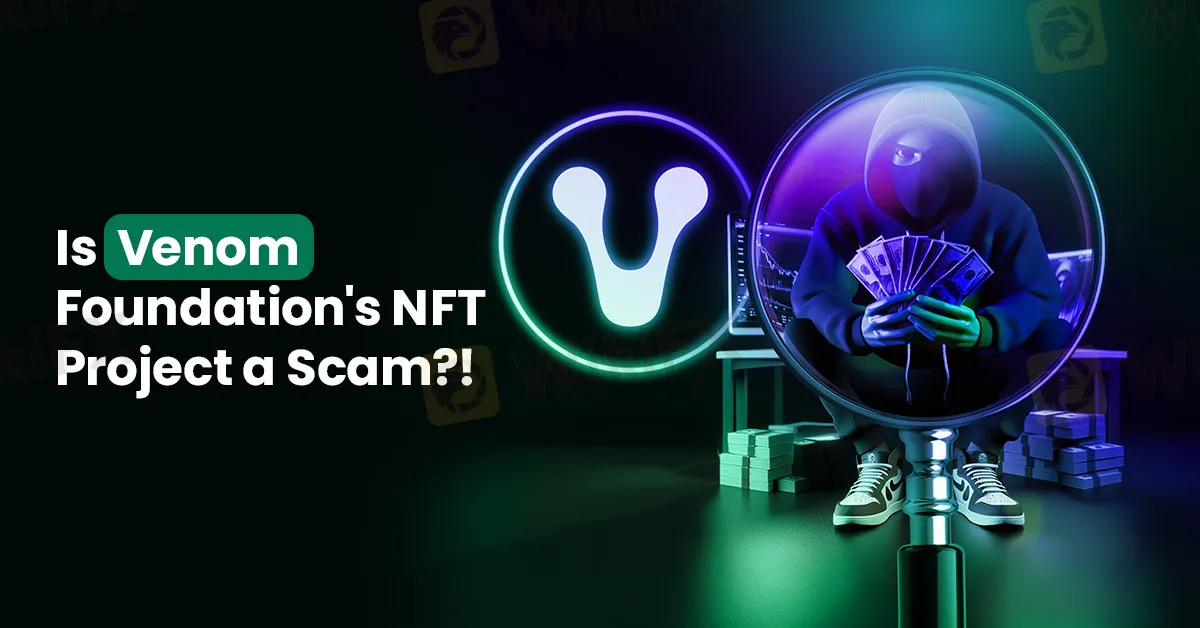简体中文
繁體中文
English
Pусский
日本語
ภาษาไทย
Tiếng Việt
Bahasa Indonesia
Español
हिन्दी
Filippiiniläinen
Français
Deutsch
Português
Türkçe
한국어
العربية
Is Venom Foundation's NFT Project a Scam?!
Abstract:In the ever-evolving landscape of blockchain innovation, the emergence of Venom Foundation's NFT project has sparked controversy and raised questions about its legitimacy and ethical practices.

In the realm of blockchain innovation, the emergence of Venom Punks in late 2022 stirred a sense of excitement and possibility. Nestled within the promises of the Venom blockchain, Venom Punks envisioned a space where decentralization thrived, offering boundless support for developers. However, what unfolded was a narrative far removed from this vision, revealing the stark realities of centralization within the Venom Foundation.

As Venom Punks embarked on their journey, crafting projects like VenomSea and Wrapped Venom Station, they stumbled upon a disconcerting trend. A parallel endeavour, venom-punks.com, not only mirrored their efforts but also appeared to receive undue endorsement from the Venom Foundation. This copycat venture not only mirrored Venom Punks' initiatives but also seemed to overshadow them with the foundation's support.

Voicing their concerns, Venom Punks shed light on what they deemed fraudulent activities by the Venom Foundation, asserting that the foundation appeared more akin to a centralized chain, operated like a family business. They suggested that this structure could provide preferential treatment to family, friends, and associates, thus limiting the success chances for builders not closely associated with the Venom Team.
In January 2023, Venom Punks established their presence across platforms like Discord and Twitter, alongside launching their domain. By May of the same year, they took a decisive stand, unveiling what they perceived as fraudulent practices by the Venom Foundation.
Their revelations pointed to a possible collusion between the foundation and venom-punks.com, aiming to replicate Venom Punks' original NFT designs and concepts. Christopher Louis Tsu, Venom Foundations current CEO, even publicly endorsed the clone project on Twitter, deepening the suspicions.
The situation escalated when Slava Semenchuk, known as Venominator on Discord, joined Venom Punks' Discord server in March of the current year. His alleged mission to defend venom-punks.com raised eyebrows within the vigilant Venom Punks community.
Despite attempts to portray the clone project as legitimate, Semenchuk's actions only fuelled suspicions. Armed with evidence, Venom Punks confronted Semenchuk, revealing a direct link between the scam project and the Venom Foundation.
The association between the scam project and the foundation became undeniable through public discussions and promotional materials. Ethical questions surfaced, questioning if the foundation's involvement aimed to supplant original innovators with a more controllable venture.
The revelation of misleading marketing tactics, false advertising, and attempts to divert traffic from the original project underscored the foundation's dubious practices. CEO Christopher's inadvertent acknowledgment of the legitimate VenomPunks.com further exposed the underlying connections.
Despite the ongoing support from the Venom Foundation, venom-punks.com openly criticized its sponsor, alleging disorganization. The irony of a project denouncing its supporter while benefiting from its backing raised eyebrows.
The involvement of Oasis Gallery added another layer of complexity. Though the foundation claimed it as an independent third-party dApp, the close ties between the gallery and the Venom Foundation suggested otherwise.
VenomPunks.com's decision to depart from the Venom chain stemmed from the foundation's failure to foster a fair environment and protect genuine developers. Their departure signifies a quest for a platform where integrity and equal opportunities reign supreme.

Disclaimer:
The views in this article only represent the author's personal views, and do not constitute investment advice on this platform. This platform does not guarantee the accuracy, completeness and timeliness of the information in the article, and will not be liable for any loss caused by the use of or reliance on the information in the article.
Read more

10 Blacklisted Brokers on WikiFX: Unveiling the Rogue Players
As 2024 draws to a close, the financial landscape remains fraught with deceptive practices and fraudulent brokers. WikiFX, a trusted broker regulatory query platform, has compiled a list of the 10 blacklisted brokers for December. These entities have earned their spot due to violations such as being unregulated, engaging in scamming activities, or forbidding client withdrawals. Here's a closer look at the brokers to avoid at all costs.

Malaysia’s Securities Commission Enforces Ban on Bybit & Its CEO
The Securities Commission Malaysia (SC) has taken enforcement action against cryptocurrency exchange Bybit Technology Ltd.

RM62k Lost Investment Scam After Joining XRP Community Malaysia on Telegram
A 30-year-old homestay manager from Chendering, Malaysia, fell victim to an online bitcoin investment scam, losing RM62,214.59. According to Kuala Terengganu police chief ACP Azli Mohd Noor, the incident unfolded after the victim joined a Telegram group named “XRP Community Malaysia” on December 19. The group promoted bitcoin investments allegedly powered by Artificial Intelligence (AI).

Russia Turns to Bitcoin for International Trade Amid Sanctions
Russian companies are increasingly using Bitcoin and other cryptocurrencies to bypass Western sanctions and facilitate international trade. The country's Finance Minister, Anton Siluanov, confirmed that cryptocurrencies mined in Russia are now being employed for foreign transactions under an experimental framework.
WikiFX Broker
Latest News
Japan to Take Action to Stabilize the Yen
Ringgit Remains Flat Amid Holidays, US Debt Concerns Loom
Taurex: Is it Safe to Invest?
Vietnamese Police Bust $1.2 Million Crypto Fraud Case
WikiEXPO Global Expert Interview: Loretta Joseph——Unlock the forefront of digital finance
XTB Receives Licenses to Operate in Indonesia & UAE
SEBI Bans Big "Finfluencers for Misleading Investors"
WikiFX New Year Bash: Chance to Win 70 USDT
Malaysia’s Securities Commission Enforces Ban on Bybit & Its CEO
Will Gold Shine Brighter in 2025?
Currency Calculator






